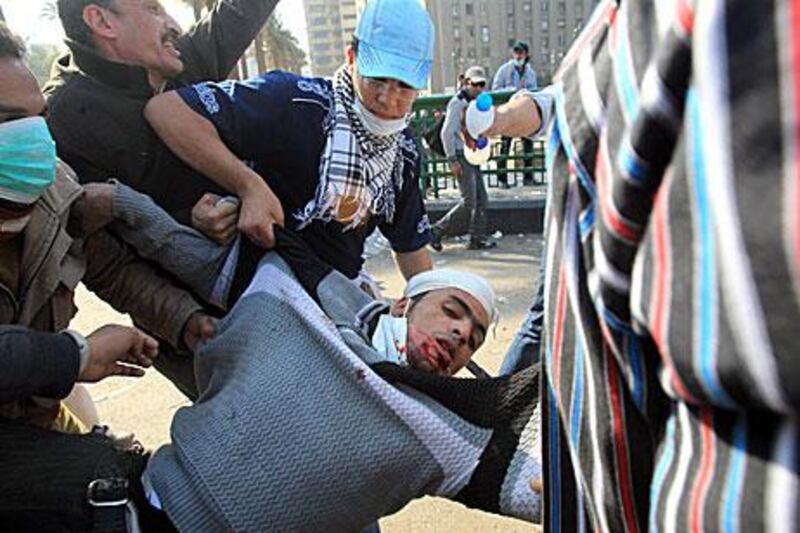CAIRO // Egyptians are converging on Cairo's central Tahrir Square in response to a call for a so-called million-man march as protests against the country's military rulers enter a fourth day.
Thousands of Egyptian protesters have been camping out on the square and clashing with police trying to force them to leave.
They hoisted a giant Egyptian flag and chanted slogans on Tuesday, evidence that an offer of resignation by the civilian cabinet the day before has failed to quell the spreading unrest.
The violent protests during which at least 33 people died provoked the resignation offer by Prime Minister Essam Sharaf's entire cabinet last night.
Al Jazeera television said the ruling military council had accepted the resignations.
However, it was reported the military would not accept them until there was agreement on a new prime minister.
The offer to quit by the cabinet, in office since March, was the latest blow to the military council's authority.
They came amid widening protests against the ruling military. Protesters are demanding that the military quickly announces a date for the handover of power to a civilian government.
Prime Minister Essam Sharaf’s government had come under consistent criticism from across the political spectrum since it came into office in March for its perceived inefficiency and its subordination to the military.
The fate of the November 28 parliamentary elections may be now be affected by the resignations and a third day of street battles between thousands of protesters and police yesterday, during which the death toll rose to at least 33.
The latest clashes were among the most violent since Hosni Mubarak stepped down as president on February 11.
"It's complete and utter confusion," said Ahmed Said, a candidate from the Free Egyptians party for parliament in the Qasr Al Nil district, which includes Tahrir Square. "I'm wondering how can we ask people to go out on the streets in a few days and vote. It's not safe."
This week, he said, was meant to be an intense period of campaigning, but had instead become a chaotic situation that threatened the country's ability to hold the first of three rounds of elections on November 28 as planned.
Tahrir Square, ground zero of the uprising earlier this year, and surrounding roads were scenes of devastation yesterday, with broken pavement and glass scattered everywhere and doctors tending to wounded protesters in makeshift clinics. Phalanxes of riot police, all in black, could be seen sporadically around the rim of the square through clouds of tear gas.
Several protesters have reportedly lost eyes from rubber bullets and other projectiles fired by the police. Protests were also held in the governorates of Suez, Alexandria, Ismailia, Assiut and Qena.
The clashes began after police tried to evacuate a small group of protesters occupying the square on Saturday with a volley of tear gas and rubber bullets. News of the attacks rallied thousands back to the square and a battle erupted with police. In the exchange between the two sides, more than 1,500 people were injured, according to the Ministry of Health.
The military also announced a long-awaited law that could see former members of the National Democratic Party, the instrument of political power for the Mubarak regime, banned from elections and political power.
Protesters in Tahrir Square yesterday said it was too late for piecemeal concessions from Scaf. Among the demands from protesters was the end of hugely unpopular military trials for civilians, a quicker transition to civilian rule, the resignation of the government and changing the super-constitutional principles.
“It’s like someone who is drowning and flailing their arms to stay above water,” said Hazem Sadek, 21, in Tahrir Square. “That’s what Scaf are doing. They are panicking.”
Several liberal political candidates announced they were suspending their campaigns after the violence. Emad Abu Ghazy, the culture minister, resigned from the cabinet to protest against the treatment of the protesters. But the powerful Freedom and Justice Party, created by the Muslim Brotherhood, only went so far as to cancel some of last night’s campaign events. The party said in a statement that Scaf is “the force responsible for everything that happened” and called for an independent investigation.
Even before the clashes erupted in Tahrir Square in the last few days, Egypt was facing a hugely complex election that had become focused in recent months nearly entirely on identity politics.
Mazen Hassan, a professor of electoral systems at Cairo University, said the entire “political competition hinges on the religious-secular axis”. He said: “The policy debate in this election has already been reduced to a footnote. The economy, health care, unemployment, spending on subsidies – all of these important topics have barely been discussed.”
The onset of violence just a week before Egyptians were expected to go to the polls was “extremely dangerous”, he said. If elections were postponed because of the protests, the situation would grow even worse because the Islamists parties would feel that their chance at winning a large portion of the seats had been unfairly taken from them, Mr Hassan said.
“Everything is now escalated,” Mr Hassan said. “Something major has to happen on behalf of the rulers … that’s the only way to cool the whole situation off.”
The protests themselves have not yet appeared to be gathering the kind of momentum that saw hundreds of thousands of Egyptians in the streets waging battle with police in January and February. Even in Tahrir Square, there were those who agreed with the military’s view that the protesters were leading the country on to a path of economic ruin.
Watching as young protesters made Molotov cocktails outside the women’s clothing store he co-owned, Mohammed Anta, 35, gave gave a different view of the protests. “Who are these people? What do they want?” Mr Anta said.
“They are thieves and thugs. Nobody is buying from us. We will have to close. We want the military to take control of this country for good.”
bhope@thenational.ae
ecunningham@thenational.ae
* With Associated Press





